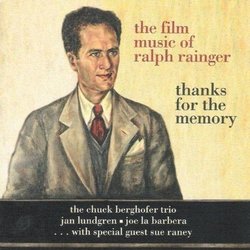| All Artists: The Chuck Berghofer Trio Title: The Film Music of Ralph Rainger: Thanks for the Memory Members Wishing: 0 Total Copies: 0 Label: Fresh Sounds Spain Original Release Date: 1/1/2008 Re-Release Date: 11/30/2008 Genres: Jazz, Pop, Soundtracks Style: Number of Discs: 1 SwapaCD Credits: 1 UPC: 8427328650489 |
Search - The Chuck Berghofer Trio :: The Film Music of Ralph Rainger: Thanks for the Memory
 | The Chuck Berghofer Trio The Film Music of Ralph Rainger: Thanks for the Memory Genres: Jazz, Pop, Soundtracks Ralph Rainger was a giant contributor to the Hollywood musical of the Thirties. At Paramount Pictures, he wrote music for seven Bing Crosby films including the initial one, The Big Broadcast in 1932. Together with lyricist... more » |
Larger Image |
CD DetailsSynopsis
Product Description Ralph Rainger was a giant contributor to the Hollywood musical of the Thirties. At Paramount Pictures, he wrote music for seven Bing Crosby films including the initial one, The Big Broadcast in 1932. Together with lyricist Leo Robin, his timeless hits included "Easy Living," "I Wished on the Moon," "If I Should Lose You," "June in January," "Love in Bloom," "Miss Brown to You," "Moanin' Low," "Please" and Academy Award winner "Thanks for the Memory." The jazz players loved his melodies then and still do today. Billie Holiday recorded five of his songs. For some inexplicable reason, he is not linked with Harold Arlen, Irving Berlin, George Gershwin, Jerome Kern, Jimmy McHugh, Cole Porter, Richard Rodgers, Harry Warren, et al., yet his best melodies were certainly equal in calibre to those icons. When he died tragically in a mid-air collision in 1942 at the age of forty-one, his fame seemed to die with him. Jan Lundgren has brilliantly interpreted Rainger's music, putting his own special meaning to fourteen tunes as they have never been heard before. Together with virtuoso bassist Chuck Berghofer, the leader on this session for the first time in his fifty year career, and Joe La Barbera, a drummer without peer, this album has a distinction all its own, containing some special moments in the ten minute conclusion that will captivate the listener. As usual with Dick Bank productions, there is a 32-page booklet filled with informative essays, rare photographs and all that one could possibly want to know about the man, the music and the men who play them. Similar CDs
|
CD ReviewsFilm Music of Ralph Rainger Given Wonderful New Life Ed Barr | Valdosta, Georgia | 12/19/2008 (5 out of 5 stars) "Jan Lundgren has taken a giant step with the release of this recording, solidifying his position among the top echelon of the world's elite jazz pianists. The identifying elements of his style - flawless touch and execution, impeccable time, clarity of articulation, and meaningful interpretation - are clearly displayed. The result is his best recording to date. Lundgren plays with such ease and total command of the keyboard that one is immediately captivated, never distracted and totally immersed in his reading of each song.
His partners are bassist Chuck Berghofer (under whose name the session appears) and drummer Joe La Barbera. They perform at a level listeners have grown to expect and subjective adjudication of these musicians is unnecessary. Unlike most of his other Fresh Sound albums where Lundgren is support (to Bill Perkins, Conte Candoli, Herb Geller, Arne Domnerus and Andy Martin), he is in complete control. The Berghofer sound has never been better recorded and La Barbera, as always, personifies the art of percussive performance. Simply stated, their playing is of the highest artistry, leaning toward perfection. Critical judgment on a performance such as this one becomes a matter of personal taste. A bonus to this already complete package is the presence of vocalist Sue Raney. This lady - who recorded an album for Capitol in 1957 - contributes beautiful renditions of "If I Should Lose You" and "Thanks for the Memory". She sounds as strong and vibrant today in what is a significant example of her voice and interpretation. I have enjoyed her singing through the years and cannot recall her sounding better. Los Angeles-based producer Dick Bank is the inspiration behind this recording as well as the well-received issue of Bronislaw Kaper film music (Fresh Sound FSR 5041 CD). As cited in the notes, Rainger, although highly successful and respected during his ten years at Paramount Pictures and the composer of numerous standards, is not a well-recognized name among songwriters despite having written music for seven Bing Crosby films. When he died in an air crash in October 1942 at the age of forty-one, his fame seemed to die with him. He's best known for the Academy Award-winning "Thanks for the Memory" and "Love in Bloom," made famous by Bob Hope and Jack Benny respectively. "Easy Living," "I Wished on the Moon" and "June in January" are other often played Rainger tunes. One might wonder, with reason, how "Love in Bloom" would fare in a jazz setting. In Lundgren's hands, it's a perfect vehicle for his rubato solo reading. He rarely strays from the original progression, but his inventive voicings and passing chords give it the sound of a contemporary ballad. In fact, the genius of this recording is that all of these songs - written in the Thirties and not for jazz performance - sound as fresh as if composed today. This recording exists on multiple levels. First and foremost, this jazz trio will bring joy to the listener even if he does not recognize the name of a single player or a tune in the collection. It offers a wonderful history of Ralph Rainger, his lyricist Leo Robin and songwriting in 1930's Hollywood. The album is superbly recorded, the Steinway Concert Grand sounds magnificent, and the balance of the three instruments and vocalist is exceptional. The contribution of recording/mixing and mastering engineers Talley Sherwood and Bernie Grundman cannot be praised too highly. Unfortunately, there is a downside. Too few people will hear this recording and the brilliance of Lundgren, Berghofer, La Barbera and Raney. The public does not clamor for jazz trios or a recording of this caliber. Is there an American jazz ideal? I will go on record as stating this is unlike any Compact Disc that has preceded it. It is of the high quality for which Dick Bank and Fresh Sound productions are known. Without a doubt, it is the most thoroughly researched and meticulously prepared of any jazz recording. The thirty-two page booklet, for which Bank set the industry standard years ago, is highly informative and contains biographies, photographs and essays of and by Rainger and Robin. There are reproductions of original sheet music covers and complete details on the selections. As always, there is fine annotation by Mark Gardner, Alun Morgan and Bank. But, there's more. The final track includes introductions and comments by Jan Lundgren (a 1937 radio interview with Rainger) and Dick Bank (the September 1940 Cavalcade of American Music) in which there are piano renditions of "Love in Bloom" by the composer. The first is on the interview, the latter from the Cavalcade with Robin singing his lyric. Having produced twenty-nine recordings, Bank has said that this is his swan song. If so, his final contribution to recorded jazz is truly a winner! This will occupy a place in the history of jazz record production. It must be in your collection. Ed Barr Valdosta, Georgia" |



